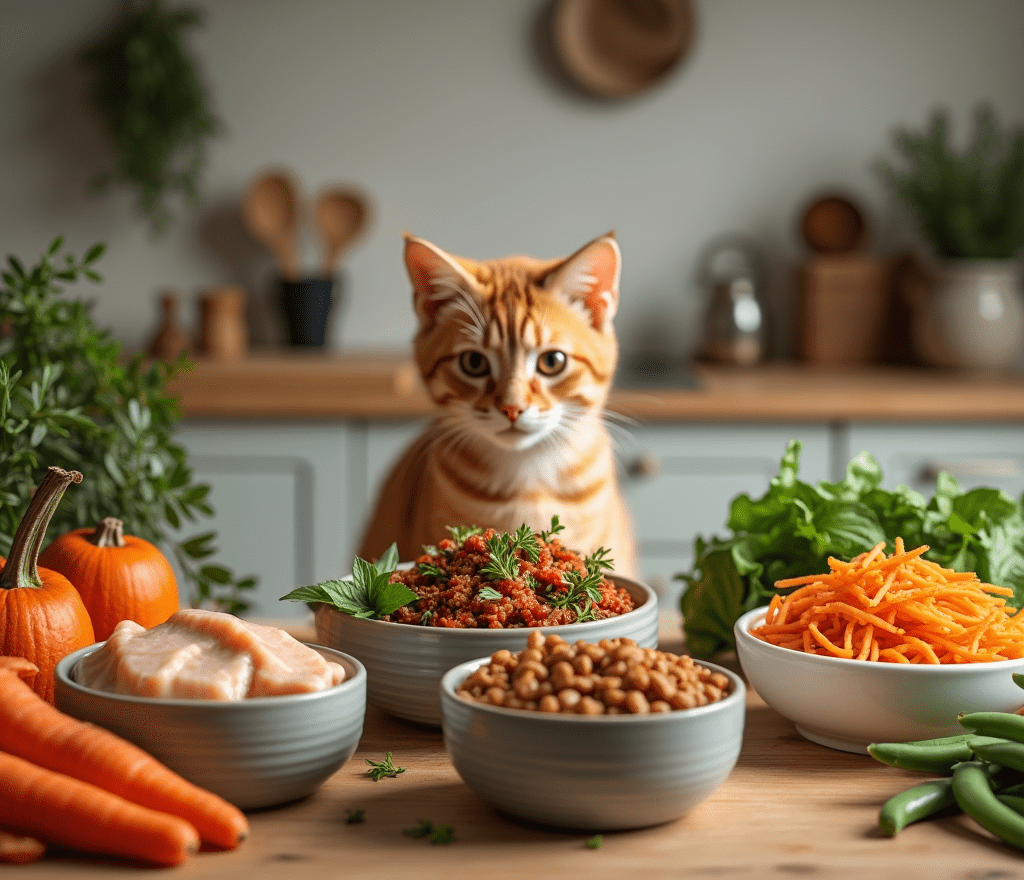Are you considering whipping up some tasty homemade treats for your cat? If so, you’re not alone. Many cat owners have started exploring homemade cat food recipes to provide their pets with a more natural and nutritious diet. After all, you want what’s best for your furry friend, right? Homemade cat food not only gives you control over the ingredients but also allows you to cater to specific dietary needs. But where do you even start with cat food recipes? And how can you make sure it’s healthy? Let’s explore everything you need to know about homemade cat food!
Why Make Homemade Cat Food?
If you’ve ever scanned the ingredients on commercial cat food, you might have noticed a lot of terms you don’t recognize. From preservatives to fillers, some of these ingredients can be less than ideal for your cat’s health. Making cat food at home allows you to know exactly what goes into each meal. You can control the quality, avoid allergens, and even cater to specific dietary needs if your cat has any. Moreover, you might be surprised to see how easy it can be to make nutritious food at home!
Things to Keep in Mind Before Starting
Consulting a Vet
Before you start experimenting with homemade recipes, it’s essential to consult a veterinarian. Cats have unique dietary needs, and it’s crucial to ensure that homemade meals will provide them with all the necessary nutrients.
Understanding Cat Nutrition
Cats are obligate carnivores, which means they require a diet high in animal protein. Essential nutrients like taurine, calcium, and specific vitamins are critical for their health. Unlike dogs or humans, cats can’t survive on a plant-based diet alone.
| Nutrient | Importance |
|---|---|
| Protein | Supports muscles and overall health |
| Taurine | Essential for heart and eye health |
| Calcium & Phosphorus | Important for bones and teeth |
| Omega-3 Fatty Acids | Reduces inflammation, supports a shiny coat |
“Cats need a high-protein, meat-based diet to thrive.”
Top Homemade Cat Food Recipes
Ready to dive into some easy, healthy recipes? Here are a few cat-approved options!
Recipe 1: Chicken & Veggie Mix
- 1 pound of boneless, skinless chicken breast
- 1/4 cup carrots (cooked and mashed)
- 1/4 cup green beans (cooked and chopped)
- 1 tsp fish oil (for omega-3)
Instructions:
- Boil the chicken until fully cooked, then chop into small pieces.
- Mash the cooked carrots and green beans.
- Mix the chicken, veggies, and fish oil.
- Let it cool before serving to your cat.
Recipe 2: Fish Feast
- 1 cup of canned salmon (in water)
- 1 boiled egg (mashed)
- 1 tsp fish oil
Instructions:
- Mash the salmon and mix with the egg.
- Add fish oil for an omega boost.
- Serve at room temperature.
Recipe 3: Turkey & Pumpkin Delight
- 1 cup of ground turkey (cooked)
- 1/4 cup pumpkin puree
- 1 tsp taurine supplement
Instructions:
- Cook the turkey and let it cool.
- Mix with pumpkin and taurine.
- Serve fresh, storing any leftovers in the refrigerator.
Additional Tips for Preparing Cat Food at Home
Making homemade cat food can be rewarding, but keep these additional tips in mind for the best results:
- Avoid Seasonings: Cats don’t need salt or spices. In fact, these can be harmful.
- Introduce Slowly: If your cat is used to commercial food, introduce homemade meals gradually to avoid stomach upset.
- Stay Consistent with Portions: Overfeeding can lead to weight gain, so ensure the portions are appropriate.
FAQs
1. Can I feed my cat homemade food every day?
Yes, but make sure the meals are balanced and meet your cat’s nutritional needs. Consult with a vet to ensure you’re not missing any essential nutrients.
2. How do I store homemade cat food?
Store it in an airtight container in the fridge for up to three days. You can also freeze portions for longer storage.
3. Can I use raw meat for cat food?
Some people choose to feed raw diets, but it requires careful preparation to avoid bacterial contamination. Always consult your vet before opting for a raw diet.
Conclusion
Providing your cat with homemade meals is an excellent way to ensure they’re getting quality ingredients and a balanced diet. With the right recipes and a bit of planning, you can treat your cat to nutritious, delicious meals that cater to their unique needs. So, why not give homemade cat food recipes a try? Your feline friend might just thank you with extra purrs and snuggles!






